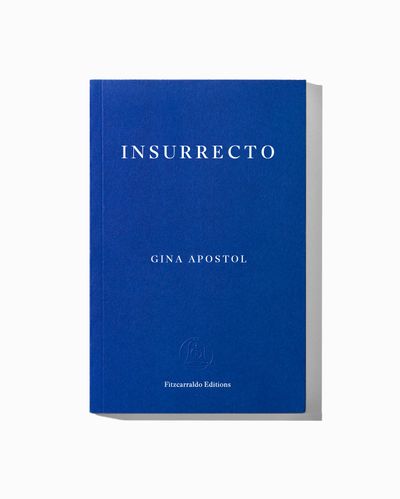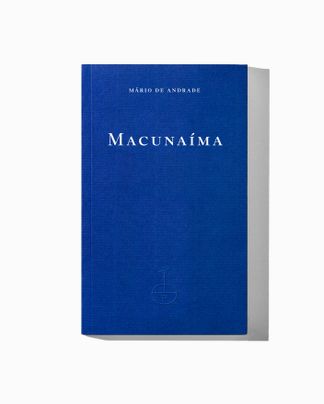In 1901, Filipino revolutionaries attacked an American garrison in Balangiga, on the island of Samar, and American soldiers created ‘a howling wilderness’ of the surrounding countryside in retaliation, murdering thousands of the inhabitants of Balangiga. In the 1970s, the American filmmaker Ludo Brasi went missing in Samar while shooting a movie, The Unintended, inspired by these events. In 2018, his daughter Chiara and the Filipino translator Magsalin go on a road trip in Duterte’s Philippines. Chiara is working on a film about the Balangiga massacre, when Magsalin reads Chiara’s film script and writes her own version of the story. Within the spiralling voices and narrative layers of Insurrecto are stories of women – artists, lovers, revolutionaries, daughters – finding their way to their own truths and histories. By pushing up against the limits of fiction in order to recover the atrocity in Balangiga, Gina Apostol shows us the dark heart of an untold and forgotten war.

Insurrecto
French paperback with flaps, 296 pages
Published 17 July 2019
Insurrecto
20. THE INSOLUBLE PUZZLE AT THE HEART OF THE LABYRINTH
For the mystery writer, it is not enough to mourn the dead. One must also study the exit wounds, invite the coroner to tea, cloud the mind with ulterior motives.
The translator and mystery writer Magsalin has undertaken (yes, no, pun) some of the above at previous incidents. But the insoluble puzzle at the heart of the labyrinth, the secret within the secret, is not hers to bemoan. That is up to the dead man’s kin, who are, fortunately or not, also dead. It is said, for instance, that the writer Stéphane Réal’s mother died in Auschwitz, his father of shrapnel wounds before the war started. The writer Stéphane Réal had a wife. She is a widow. Her heart must be broken. (Magsalin cannot do that for her.)
For the mystery writer, there are clues. Sheaves of paper with marginal notes, clippings of newsprint events of general interest, such as the Tunis–Marseille ship schedule, lottery numbers, and election results for the mayor of the commune Ivry-sur-Seine, 1979 (the winner is a communist). Everything could be a sign, and a word has at least two meanings, all of them correct. And it is not right to jump to conclusions, especially when it becomes apparent that one’s sorrow is misplaced in this instance.
First, the writer Stéphane Réal has been dead for some time. Second, Magsalin has read only two of his books. Third, it turns out he does not figure at all except as premonitory prompt, place holder in this story of disappearance Magsalin is about to tell as she slips a hoard of facts into her duffel bag (leather, made in Venice, aubergine with olive handles, always admired by salesladies): to wit, the writer’s income tax returns, an unmailed box covered in pale blue whorls, doubled postcard-size photographs, books with slips of paper falling out, index cards slipping from loose envelopes, a stash of library books the writer thought he would have time to return.
Her protagonist, what do you know, is female. The dead male writer that prompts the story waves goodbye. It turns out the woman is a filmmaker of moody artistry whose scandalous father precedes her fame. The woman’s name has an arbitrary Italian flavor—Chiara or Lucia, with the first C glottal and the last c a florid ch: she is Kiiiara, or Luchiiiia. Magsalin has yet to decide the name, an act that must occur without the reader’s noticing. Both names mean clear, or lucidity, or something that has to do with light, something vaguely linked to eyesight, hence to knowing, thence to blindness, or paradox.
Choosing names is the first act of creating
2. AT ALI MALL
Magsalin gets the dossier from the filmmaker herself, who emails Magsalin. Microsoft Outlook warns: Mail thinks this message is Junk. Magsalin likes that her Mail thinks, but she doubts it. The subject line is intriguing.
Translator needed, meet me at Muhammad Ali Mall.
The message must be from a foreigner. No one in Manila calls the mall by that name. Some Filipinos do not even know that that seedy building in the traffic hellhole that is Cubao is named for the greatest—Muhammad Ali.
Magsalin ignores the message.
She is jet-lagged. She has just arrived from New York, on vacation in her birthplace, and she has no time for paid work. She is trying to unwind in Manila, hoping to continue a task that she believes has great spiritual payback, though the rewards are yet to surface.
She has begun her mystery novel.
She arrives with her baggage. A balikbayan box for her uncles, whose home she is visiting on this trip. The box is packed with vinyl records from bargain bins in a shop on Bleecker Street—Neil Sedaka, Ray Conniff and His Singers, the elegies of Karen Carpenter, and for good measure a new press of their favorite, Elvis, Aloha from Hawaii, still in cello-wrap, plus bottles of Johnnie Walker Black Label that she thought might appease them. She has been gone for so long. All wrapped up in bath towels from Marshalls and stuffed with bags of Hershey’s Kisses in the extra spaces. Another suitcase, filled with books. In her duffel, aubergine with olive handles, a square box, covered in pale blue whorls.
When Magsalin finally opens the email message, it only repeats its subject line, run-on included.
Translator needed, meet me at Muhammad Ali Mall. Signed.
The curtness of it, Magsalin thinks, is rude. She thinks the message is a joke, a hoax drummed up by her writer friends, a bunch of alcoholics hiding out in pork-induced stupor in Flushing, Queens.
Not even her mother’s phone call had moved her to return home.
“I cannot go home,” Magsalin had told her mother a long time ago.
“Do not come home,” her mother had said on the phone. “If you feel you cannot do it, inday—do not return.”
So she had not.
The reasons for return need not be sentimental: they could be an intellectual project, a way to deal with writer’s block, or a respite during a cheap-airfare month. For a mystery writer, it is correct to return to soak in the atmosphere, to check out a setting, to round out a missing character, to find the ending.
Later, of course, she searches the Web for the filmmaker’s name.
The search results include an item only eighteen hours ago mentioning Chiara Brasi’s arrival in Manila. The report is an innocuous piece with a photo of the filmmaker at Ninoy Aquino International Airport, wearing huge shades and what looks like a safari outfit. Chiara is scouting locations for a movie, but no quote emerges from the director herself.
Magsalin checks praxino.org, her website of choice for cultural curiosities. A Philippine tour operator reports in a news update that Tom Cruise was sighted in August at a resort in the Ilocos, sporting an ugly ingrown toenail revealed by beach flipflops. Sandra Bullock did not buy her black baby in the area near the old US Air Force base in Pampanga. Madonna’s orphanage in Malawi is losing money, its website hacked by teenagers. Eric Clapton’s late son’s former nanny, a Chabacano, is said to be in seclusion in Zamboanga, an island in the far South, near the pirates—she still mourns her single lapse. Once again, Donatella Versace did not slap her maid. A video of Chiara Brasi shows a wan and wavering figure, in one of those canned interviews to promote a project. This detail appears in FabSugar, the Emory Wheel, the Irish Times, romania-insider.com, the Kansas City Star, the Prague Post, gmanetwork, inq7. net, and Moviefone: at age five Chiara rode a helicopter over Manila with her father when he was filming his war movie about Vietnam. A fond memory, in 1976. Someone had unhinged the helicopter’s doors, and she looked out as if the sky were her vestibule.
Magsalin goes back to the email message.
She hits SEND.
(…)
Publishers Weekly Top Ten Books of 2018
‘A bravura performance in which war becomes farce, history becomes burlesque … Apostol is a magician with language (think Borges, think Nabokov) who can swing from slang and mockery to the stodgy argot of critical theory. She puns with gusto, potently and unabashedly, until one begins reading double meanings, allusions and ulterior motives into everything.’
— Jen McDonald, New York Times
‘[A] thrillingly imagined and provocative inquiry into the nature of stories and the unfolding of history in our collective consciousness…. [Insurrecto] is tackling the issue of cultural appropriation, but it never ventures close to anything like a crass attempt at resolution, instead using the complexity of its narrative and thematic structure to hint at the difficulty in understanding the confluence of history, power and the individual.’
— Tash Aw, the Guardian
‘Gina Apostol – a smart writer, a sharp critic, a keen intellectual – takes on the vexed relationship between the Philippines and the United States, pivoting on that relationship’s bloody origins. Insurrecto is meta-fictional, meta-cinematic, even meta-meta, plunging us into the vortex of memory, history, and war where we can feel what it means to be forgotten, and what it takes to be remembered.’
— Viet Thanh Nguyen, author of The Sympathizer
‘In Insurrecto, a polymath’s lyricism is woven with sharp cultural study and post-colonial tristesse. A deft and labyrinthine depiction of our helpless condition of ever-revolving insurrection, Gina Apostol has created an elegant mise en abyme wherein the colonizer and the colonized reflect themselves over and over and yet over again.’
— Eugene Lim, author of Dear Cyborgs
‘Apostol weaves the complex tangle of Philippine history, literature, and languages (along with contemporary academic scholarship) into a brilliant tour de force.’
— John Barth, author of Lost in Funhouse
‘A searing and psychedelic road trip through the long, sordid history of Philippine-American relations, Insurrecto is at once a murder mystery, a war movie, and a moving exploration of all the ways grief lives on, both in a people and in a person. A masterful puzzle, in which, as Apostol writes, “one story told may unbury another.”’
— Elaine Castillo, author of America is Not the Heart
‘There’s a telling line in the acknowledgments to Gina Apostol’s complex though entertaining novel. “Is it a mystery, a history, a dirge, a comedy, why the hell is it all of the above?” she writes. Quite. Trying to explain its bizarre brilliance is tricky, but essentially it tracks American film-maker Chiara and translator Magsalin as they try and make sense of a 1901 atrocity committed by US soldiers on Samar, an island in the Philippines. The pair go on a road trip, pick up fragments of stories and write their own versions of the massacre in non-sequential chapters. The truth about the awful event isn’t as important as the fact it has been recognised.’
— Ben East, Observer
‘A risk-taking, cinematic look at Duterte’s Philippines and the 1901 Balangiga massacre during the Philippine-American war … Apostol uses techniques from Jorge Luis Borges and Julio Cortázar, expecting the reader to trust her as the story hopscotches through time and space. But for readers accustomed to the jump-cuts and montages of cinema, Insurrecto doesn’t present a challenge so much as a cascade of pleasures and possibilities.’
— Nilajana Roy, Financial Times
‘Apostol is preoccupied by the ways that history is mediated – and inevitably distorted – by artists and journalists, whether through photography, films or books … Brain candy for the theory-minded.’
— Sam Sacks, Wall Street Journal
‘Apostol is no mystifier or arid avant-gardiste. Rather, she’s playful like Italo Calvino or Kurt Vonnegut. She dishes up funny riffs on everything from the “Thrilla in Manila” and her countrymen’s love of Elvis Presley to what the book terms the Filipino Chekhov Rule: If you mention karaoke in the first chapter, somebody has to sing it in the last one … It’s Insurrecto’s great achievement that it confronts us with dreadful things without ever turning into an accusatory, anti-American screed. See, Apostol is after more than recrimination. Steeped in the love-hate relationship with American culture she shares with most Filipinos, she actually seeks to transcend the gap between the two countries.’
— John Powers, NPR’s Fresh Air
‘Stunning … An arresting novel with a timely political message, Apostol’s Insurrecto dazzles with its inventive structure and superb portrayals of women as leaders of ingenuity, creativity and reason.’
— Rigoberto González, Los Angeles Times
‘Wickedly funny. .. Ferocious in its political indignation … Pick one of the many figures offered by the novel itself: a palimpsest, a translation, a stereoscope, an abaca weave. Insurrecto is all of these things – a polyphonic work that challenges the reader to keep up with its plotting and to think with or against or through its complex moral reckonings.’
— Boston Globe
‘Feisty and fun, written with fluidity and grace, this “locked-room puzzle” of a novel is not to be missed.’
— The Manila Times
‘[Insurrecto] begins in the present, when a Filipina writer and translator, Magsalin, agrees to help a stylish, young Sofia Coppola-esque American director, Chiara, who is making a film about a forgotten 1901 atrocity in which American occupiers retaliated against a Filipino uprising. After Magsalin reads Chiara’s script, she writes one of her own, and soon we’re reading two competing versions of historical events – one from the perspective of a white American socialite photographer, the other from the point of view of a Filipina schoolteacher. In the end, both Magsalin and Chiara believe they have failed in telling a true account of the event – but Apostol has not.’
—T Magazine
‘Gina Apostol uses an array of literary and cinematic techniques: memoirs, jump cuts, close-ups, and reveries to set a story in Duterte’s Philippines that shows us that though victors often write histories, survivors and artists can revise them.’
—NPR’s Weekend Edition
Gina Apostol’s third book, Gun Dealers’ Daughter, won the 2013 PEN/Open Book Award and was shortlisted for the William Saroyan International Prize. Her first two novels, Bibliolepsy and The Revolution According to Raymundo Mata, both won the Juan Laya Prize for the Novel (Philippine National Book Award). Her essays and stories have appeared in the New York Times, Los Angeles Review of Books, Foreign Policy, Gettysburg Review and Massachusetts Review. She lives in New York City and western Massachusetts and grew up in Tacloban, Philippines. She teaches at the Fieldston School in New York City.




